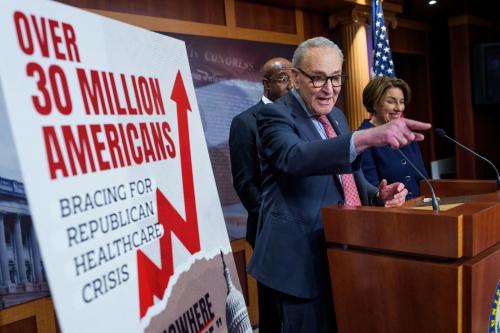Internal Revenue Service Commissioner John Koskinen has become the latest prominent example of how the poisonous relations between congressional Republicans and the Obama Administration are wreaking serious damage on the federal government and the country. No, this is not another tale of threats of public default, government shutdowns, unending efforts to nullify duly enacted laws such as the Affordable Care Act and Dodd-Frank, or House Oversight Committee Chairman Darrell Issa’s crusades to get to the “truth” on Benghazi and other alleged scandals by the Administration. Instead, it is a story of how the federal government’s acknowledged management problems are exacerbated if not rooted in the behavior (or misbehavior) of the Congress.
Koskinen is a legendary figure among government aficionados, one of the most effective and respected public managers of his generation. His work spans the private (chairman and CEO of The Palmieri Company, which specialized in the turnaround of large, failed enterprises such as Penn Central), nonprofit (president of the U.S. Soccer Foundation, board chairman of Duke University), and public sectors (clerk for David Bazelon, Chief Judge of the U.S. Court of Appeals for the District of Columbia, staff member of the Kerner Commission, legislative assistant to NYC Mayor John Lindsay, administrative assistant to Senator Abraham Ribicoff, Deputy Mayor of the District of Columbia, Deputy Director for Management at OMB, chair of the President’s Council on Y2K, and non-executive chairman and interim CEO of Freddie Mac).
Koskinen agreed to come out of retirement once again to lead the beleaguered IRS. The agency was embroiled in a controversy surrounding its improper use of specific names and political themes in selecting political groups for scrutiny of their tax-exempt status. His appearance at a hearing of the House Ways and Means Committee dealt with the circumstances under which a number of emails (made to or received by Lois Lerner, former director of the Exempt Organizations Unit) were sought by the Committee but unavailable because of a computer crash and hard drive recycling.
The questions pursued by the committee were reasonable but the unwillingness of Republicans to give Koskinen a chance to answer them was not. The hearing took on the appearance of a “star chamber” (although this one was televised on C-Span). When given a chance by Democrats on the committee, Koskinen calmly explained what he had done after learning about the missing email and why. I believe most nonpartisan viewers of his testimony would find his actions and explanations perfectly plausible. He didn’t grovel or apologize in the face of the political fusillade, nor did he rise to the bait of his accusers, one of whom, Paul Ryan, effectively called him a liar.
One would never know from this or similar congressional oversight hearings that IRS has serious problems, many arising from vast new responsibilities (e.g. the ACA), inadequate resources, and low staff morale in the face of widespread hostility in Congress to the very idea of an Internal Revenue Service. Koskinen, the turnaround specialist par excellence, has begun that effort, but House Republicans have very different priorities when it comes to the IRS and to the federal government more broadly. Berating honorable public servants, cutting operating budgets to the bone, and using the oversight process mainly to advance a partisan war, Republicans in Congress have become a formidable obstacle to more effective public management.
The Brookings Institution is committed to quality, independence, and impact.
We are supported by a diverse array of funders. In line with our values and policies, each Brookings publication represents the sole views of its author(s).




Commentary
Polarization’s Threat to Effective Public Management: The IRS Case
June 23, 2014